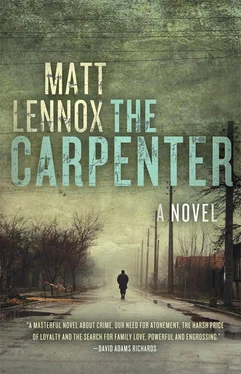Matt Lennox - The Carpenter
Здесь есть возможность читать онлайн «Matt Lennox - The Carpenter» весь текст электронной книги совершенно бесплатно (целиком полную версию без сокращений). В некоторых случаях можно слушать аудио, скачать через торрент в формате fb2 и присутствует краткое содержание. Жанр: Криминальный детектив, на английском языке. Описание произведения, (предисловие) а так же отзывы посетителей доступны на портале библиотеки ЛибКат.
- Название:The Carpenter
- Автор:
- Жанр:
- Год:неизвестен
- ISBN:нет данных
- Рейтинг книги:5 / 5. Голосов: 1
-
Избранное:Добавить в избранное
- Отзывы:
-
Ваша оценка:
- 100
- 1
- 2
- 3
- 4
- 5
The Carpenter: краткое содержание, описание и аннотация
Предлагаем к чтению аннотацию, описание, краткое содержание или предисловие (зависит от того, что написал сам автор книги «The Carpenter»). Если вы не нашли необходимую информацию о книге — напишите в комментариях, мы постараемся отыскать её.
The Carpenter — читать онлайн бесплатно полную книгу (весь текст) целиком
Ниже представлен текст книги, разбитый по страницам. Система сохранения места последней прочитанной страницы, позволяет с удобством читать онлайн бесплатно книгу «The Carpenter», без необходимости каждый раз заново искать на чём Вы остановились. Поставьте закладку, и сможете в любой момент перейти на страницу, на которой закончили чтение.
Интервал:
Закладка:
Stan moved up and shoved the shotgun away with his boot. He heard Dick call after him from outside and he turned his head and shouted that he was alright. Up above, the trusses were creaking quietly. Lee had not bled through the hole in his jacket but he’d bled down his jeans onto the hard-packed dirt around him. He was pale as candle wax.
— Lee, said Stan.
Lee’s eyes were fixed not on the old man but at a point in the middle distance. He spoke in a dry and cracked voice: One time I guessed I knew something.
— Tell me where the boy is.
— I guessed I knew something. But I wasn’t right at all.
— Where is he, Lee?
— I was wrong about it the whole time. Everything. Maybe you think you can understand that. But you can’t.
Lee lifted his hand and grasped the edge of the locker door. He was able to pull it open a few inches and then he dropped his hand back onto the ground.
Stan reached the.410 forward and hooked the foresight on the door and pulled it open. The door was heavier than it looked. He thought the boy was dead until he saw the eyes blinking on either side of the broken nose. The boy’s mouth moved.
— You can’t understand it, said Lee.
— I can understand it. All of it, pretty clear.
The man on the ground shook his head: No. There’s nothing clear.
— He’s alive, Lee.
Where he goes, I won’t see him.
But already the old man was turning away, calling to his friend outside. What remained for Lee was that which lingers through the smallest, loneliest hours. Rising, stirring, stepping out of the dark, calling his name.
It had always been there.
The new year came and there was a great deal of talk in town and there was talk through the months that followed and the talk was inflated and inaccurate and everybody claimed ownership of some stake in it, somebody they’d known. A vast number of persons claimed to have witnessed the robbery itself. Or at least to have heard it. Or at least to have known somebody who had witnessed it or had heard it. In the retellings, there were thousands of gallons of blood spilled out at the defunct marina on Indian Lake. There was a battle among the perpetrators and a war with the police that lasted half a day. Spring came and the snows receded and the leaves budded pale on the trees and the birds returned and the days grew long. The scope of what people talked about began to swell beyond the limits of the town, which itself had begun to fade back into the ordinary once again.
On the face of the headstone was her name, Edna Eunice Maitland , and the years she’d lived, and an engraved epitaph:
That bells should joyful ring to tell
A soul had gone to heaven,
Would seem to me the proper way
A good news should be given.
Beside the epitaph, there was a simple depiction of a stand of birch trees and a path winding among the trees and out of sight. Patterns of light and shadow shifted on the stone from the tree above, which was not birch but white ash, newly flowered. She was three years interred in the earth and beside her was the plot the old man had arranged for himself in times to come. In the fall, Mary had dug a small flower bed in front of the headstone and planted hyacinth bulbs in the soil and they’d bloomed well.
Now that the good weather had arrived, he could come to visit more often. There was much to tell her and only standing there could he say it. Not that words were necessary. Mary’s health, Frank’s health, the news from the last letter he’d received-two weeks ago-from her sister in Toronto. Emily would be there come September and she said how she would go to visit her great-aunt every few weeks. That was worth telling. Very much. And how today when he left the cemetery he was going to pick Louise up from school and go out to the stand on the west side of Indian Lake to see what birds they could name. In the cab of the truck he’d brought along the 10x42 field glasses. He did not think when they got there that he’d even cast a glance at Alec Reynolds’s property to the north.
There was more. He looked away from the words on the stone, the image of the birch trees and the winding path.
There was the house. Sold not three weeks after he’d had it listed. A young couple from the city with two kids, looking for a summer cottage. They’d spoken of the view and of the flower garden in the dooryard, despite the weeds that had grown in it. And they asked him if they could buy the piano in the front room. He told them no. The piano was not for sale. But they could have it free for the asking.
He’d found a place in town. A small townhouse on the end of a row. It backed onto a long grove of trees on the edge of the golf course. He could take the dog walking. He could leave the house on Echo Point for what it was, timber and stone and nothing more. He thought he could.
He also thought about the affairs over the last several months, but he did not dwell on them as much as he had expected he would. Frank had congratulated and thanked him in a civic ceremony, but had almost nothing to say about it in private. They had, however, gone fishing a few times-just the two of them, and at Frank’s invitation-after trout season opened in April. Dick Shannon, who’d also been part of the civic commendation, had put in his retirement paperwork a week later.
The incident itself-the robbery at the National Trust and the bloodshed that had followed-wasn’t something that could be put to rest simply by awarding civic commendations, or by telling and retelling it in newspapers and on the national news. The incident defied categorization. Sometimes what came back to Stan was sitting at the roadhouse with the man who’d called himself Colin Gilmore, Gilmore leaning back against the bar, saying, You think up some more questions if you want , before he got up and disappeared. The truth was, Stan hadn’t known what to ask the man then, or what to say to him. He didn’t know any better now.
And Leland King, who’d survived, had nothing to say. Nothing by way of explanation, nothing in his own defence. Maybe Lee thought the world had finished listening to him a long time ago. He was probably right.
Lastly, there was the question of Judy Lacroix, whether she had or hadn’t taken her own life. Nobody would ever know, and nobody could ever make it right. But it didn’t trouble Stan as much as it had in the fall, even though he still thought about her. And he still thought, every day, about her uncle Darien, turning at the bottom of the hangman’s rope. He knew that Darien Lacroix would be his to think about, no matter what, for as long as he had thoughts in his head.
But he’d done what he could, and that had to stand for something, in his own heart if nowhere else. He’d even had supper on two occasions with Eleanor Lacroix and Tommy Spencer. Eleanor was pregnant.
The breeze stirred and moved the hyacinth blossoms and turned the water that had run from his eyes down the seams of his face cold. He lifted a hand and rubbed back the tears and he told Edna so long for this week.
He walked back down the gravelled footpath to where his truck was parked in the lane and as he came close to it, Cassius sat up in the bed and looked at him. He opened the door and got in and turned on the truck. He was about to put it into gear but he didn’t. He got out again. He went around to the tailgate and lowered it and told the dog to get down. The dog hopped down and stretched and then looked at him.
Stan closed the tailgate and walked up to the passenger door and opened it.
— Get in.
The dog looked at him.
— Get in, you stubborn bastard.
The dog whined once and then sat back.
— Look. I can’t lift you any more.
It took some coaxing and patting the seat before Cassius stood back up and reared and jumped and scrabbled his way into the cab. He got up onto the seat and turned around and looked at Stan for further guidance, unaccustomed as he was to the front of the truck, but Stan only closed the door and came around and got back in the driver side and closed his own door. Then he put the truck into gear and carried on with his afternoon.
Читать дальшеИнтервал:
Закладка:
Похожие книги на «The Carpenter»
Представляем Вашему вниманию похожие книги на «The Carpenter» списком для выбора. Мы отобрали схожую по названию и смыслу литературу в надежде предоставить читателям больше вариантов отыскать новые, интересные, ещё непрочитанные произведения.
Обсуждение, отзывы о книге «The Carpenter» и просто собственные мнения читателей. Оставьте ваши комментарии, напишите, что Вы думаете о произведении, его смысле или главных героях. Укажите что конкретно понравилось, а что нет, и почему Вы так считаете.












